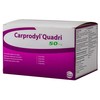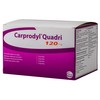Carprodyl
Carprodyl Tablets are scored, circular beige tablets containing as active ingredient 20mg, 50 mg or 120 mg carprofen.
Carprodyl is used for analgesia and reduction of inflammation caused by musculo-skeletal disorders and degenerative joint disease of the dog. Carprodyl Tablets can also be used in the management of post-operative pain in dogs.
Carprodyl Quadri 50mg Tablet
£0.71Carprodyl Quadri 50mg Tablets are indicated for analgesia and reduction of chronic inflammation, for example in osteoarthritis and degenerative joint disease in dogs. Carprodyl Quadri...[More info]
Carprodyl Quadri 120mg Tablet
£1.15Carprodyl Quadri 120mg Tablets are indicated for analgesia and reduction of chronic inflammation, for example in osteoarthritis and degenerative joint disease in dogs. Carprodyl Quadri...[More info]
Carprodyl Tablets are scored, circular beige tablets containing as active ingredient 20 mg, 50 mg or 100 mg carprofen. Carprodyl is used for analgesia and reduction of inflammation caused by musculo-skeletal disorders and degenerative joint disease of the dog. Carprodyl tablets can also be used in the management of post-operative pain in dogs.
For oral administration. The tablets are flavoured and are readily consumed by most dogs when offered. An initial dose of 4 mg carprofen/kg bodyweight/day is recommended to be given as a single dose or in two equally divided doses. Subject to clinical response the dose may be reduced. To extend analgesic and anti-inflammatory cover post operatively, parenteral therapy with carprofen injection may be followed with carprofen tablets at 4mg/kg/day for up to 5 days.
Duration of treatment will be dependent upon the response seen. Long-term treatment should be under regular veterinary supervision. Do not exceed stated dose, do not use in cats, or in pregnant or lactating bitches. Do not use in dogs suffering from cardiac, hepatic or renal disease, where there is a possibility of gastro-intestinal ulceration or bleeding or where there is evidence of a blood dyscrasia or hypersensitivity to the product. Do not use in puppies less than 4 months of age.
Do not administer other NSAIDs concurrently or within 24 hours. Some NSAIDs may be highly bound to plasma proteins and compete with other highly bound drugs, which can lead to toxic effects. Response to long-term treatment should be monitored at regular intervals by a veterinary surgeon. Carprofen must not be administered with glucocorticoids. For animal treatment only. Keep out of reach and sight of children.
Carprofen is a non-steroidal anti-inflammatory drug (NSAID) of the 2-aryl propionic acid class and possesses anti-inflammatory, analgesic and antipyretic activities. The mechanism of action of carprofen, like other NSAIDs, is believed to be associated with the inhibition of cyclo-oxygenase activity.
Two unique cyclo-oxygenases have been described in mammals. The constitutive cyclo-oxygenase, COX-1, synthesizes prostaglandins necessary for normal gastrointestinal and renal function. The inducible cyclo-oxygenase, COX-2, generates prostaglandins involved in inflammation. Inhibition of COX-1 is thought to be associated with gastrointestinal and renal toxicity while inhibition of COX-2 provides anti-inflammatory activity. In an in-vitro study, using canine cell cultures, carprofen demonstrated selective inhibition of COX-2 versus COX-1. Clinical relevance of these data has not be shown.
Carprofen has also been shown to inhibit the release of several prostaglandins in two inflammatory cell systems: rat polymorphonuclear leukocytes (PMN) and human rheumatoid synovial cells, indicating inhibition of acute (PMN system) and chronic (synovial cell system) inflammatory reactions.
Several studies have demonstrated that carprofen has modulatory effects on both humoral and cellular immune responses. Carprofen also inhibits the production of osteoclast-activating factor (OAF), PGE1 and PGE2 by its inhibitory effect on prostaglandin biosynthesis.
After oral administration, carprofen is well absorbed in the dogs. Following the administration of the product tablets in dogs, a mean Cmax (maximum concentration in serum) of 6.1 mg/L and 3.6 mg/L was achieved at approximately 1 hour for Carprofen R(-) and Carprofen S(+), respectively. For both enantiomers, the mean half-life was approximately 9 hours. The analgesic effect from each dose persists for at least 12 hours.

